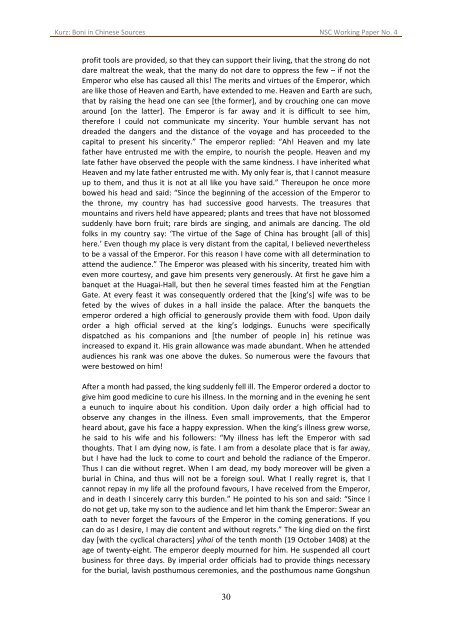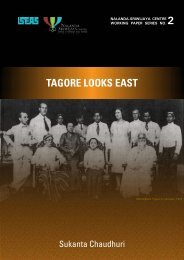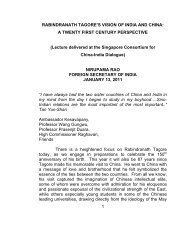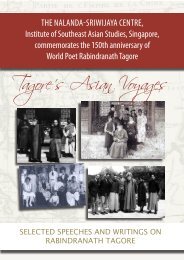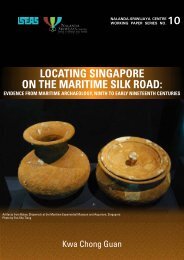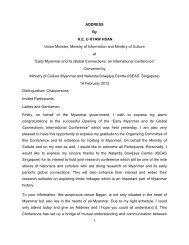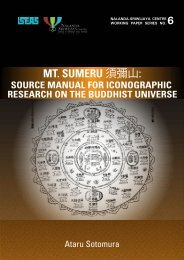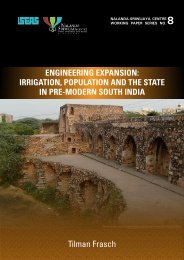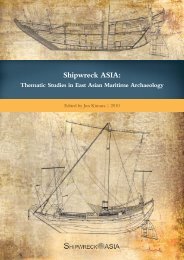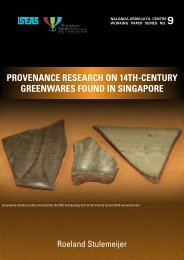Boni in Chinese Sources - Nalanda-Sriwijaya Centre - iseas
Boni in Chinese Sources - Nalanda-Sriwijaya Centre - iseas
Boni in Chinese Sources - Nalanda-Sriwijaya Centre - iseas
Create successful ePaper yourself
Turn your PDF publications into a flip-book with our unique Google optimized e-Paper software.
Kurz: <strong>Boni</strong> <strong>in</strong> Ch<strong>in</strong>ese <strong>Sources</strong> NSC Work<strong>in</strong>g Paper No. 4profit tools are provided, so that they can support their liv<strong>in</strong>g, that the strong do notdare maltreat the weak, that the many do not dare to oppress the few – if not theEmperor who else has caused all this! The merits and virtues of the Emperor, whichare like those of Heaven and Earth, have extended to me. Heaven and Earth are such,that by rais<strong>in</strong>g the head one can see [the former], and by crouch<strong>in</strong>g one can movearound [on the latter]. The Emperor is far away and it is difficult to see him,therefore I could not communicate my s<strong>in</strong>cerity. Your humble servant has notdreaded the dangers and the distance of the voyage and has proceeded to thecapital to present his s<strong>in</strong>cerity.” The emperor replied: “Ah! Heaven and my latefather have entrusted me with the empire, to nourish the people. Heaven and mylate father have observed the people with the same k<strong>in</strong>dness. I have <strong>in</strong>herited whatHeaven and my late father entrusted me with. My only fear is, that I cannot measureup to them, and thus it is not at all like you have said.” Thereupon he once morebowed his head and said: “S<strong>in</strong>ce the beg<strong>in</strong>n<strong>in</strong>g of the accession of the Emperor tothe throne, my country has had successive good harvests. The treasures thatmounta<strong>in</strong>s and rivers held have appeared; plants and trees that have not blossomedsuddenly have born fruit; rare birds are s<strong>in</strong>g<strong>in</strong>g, and animals are danc<strong>in</strong>g. The oldfolks <strong>in</strong> my country say: ‘The virtue of the Sage of Ch<strong>in</strong>a has brought [all of this]here.’ Even though my place is very distant from the capital, I believed neverthelessto be a vassal of the Emperor. For this reason I have come with all determ<strong>in</strong>ation toattend the audience.” The Emperor was pleased with his s<strong>in</strong>cerity, treated him witheven more courtesy, and gave him presents very generously. At first he gave him abanquet at the Huagai‐Hall, but then he several times feasted him at the FengtianGate. At every feast it was consequently ordered that the [k<strong>in</strong>g’s] wife was to befeted by the wives of dukes <strong>in</strong> a hall <strong>in</strong>side the palace. After the banquets theemperor ordered a high official to generously provide them with food. Upon dailyorder a high official served at the k<strong>in</strong>g’s lodg<strong>in</strong>gs. Eunuchs were specificallydispatched as his companions and [the number of people <strong>in</strong>] his ret<strong>in</strong>ue was<strong>in</strong>creased to expand it. His gra<strong>in</strong> allowance was made abundant. When he attendedaudiences his rank was one above the dukes. So numerous were the favours thatwere bestowed on him!After a month had passed, the k<strong>in</strong>g suddenly fell ill. The Emperor ordered a doctor togive him good medic<strong>in</strong>e to cure his illness. In the morn<strong>in</strong>g and <strong>in</strong> the even<strong>in</strong>g he senta eunuch to <strong>in</strong>quire about his condition. Upon daily order a high official had toobserve any changes <strong>in</strong> the illness. Even small improvements, that the Emperorheard about, gave his face a happy expression. When the k<strong>in</strong>g’s illness grew worse,he said to his wife and his followers: “My illness has left the Emperor with sadthoughts. That I am dy<strong>in</strong>g now, is fate. I am from a desolate place that is far away,but I have had the luck to come to court and behold the radiance of the Emperor.Thus I can die without regret. When I am dead, my body moreover will be given aburial <strong>in</strong> Ch<strong>in</strong>a, and thus will not be a foreign soul. What I really regret is, that Icannot repay <strong>in</strong> my life all the profound favours, I have received from the Emperor,and <strong>in</strong> death I s<strong>in</strong>cerely carry this burden.” He po<strong>in</strong>ted to his son and said: “S<strong>in</strong>ce Ido not get up, take my son to the audience and let him thank the Emperor: Swear anoath to never forget the favours of the Emperor <strong>in</strong> the com<strong>in</strong>g generations. If youcan do as I desire, I may die content and without regrets.” The k<strong>in</strong>g died on the firstday [with the cyclical characters] yihai of the tenth month (19 October 1408) at theage of twenty‐eight. The emperor deeply mourned for him. He suspended all courtbus<strong>in</strong>ess for three days. By imperial order officials had to provide th<strong>in</strong>gs necessaryfor the burial, lavish posthumous ceremonies, and the posthumous name Gongshun30


